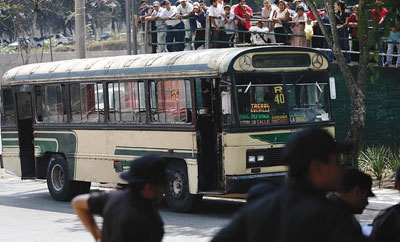Three bus drivers were shot to death in a single day in Guatemala, illustrating the threat that the country’s transport workers are under from criminal groups who demand extortion payments.
The first victim, Mario Augusto Salazar, was killed by three gunmen who were traveling as passengers in a bus he was driving between between two towns in southwestern Guatemala. Authorities are investigating whether he was killed for failing to pay extortion fees, reported La Prensa Libre.
The other two victims, drivers Dimas Mendez Rodas and Jose Angel Ramos Jimenez, were murdered by gunmen in the province of Jutiapa and in Guatemala City, respectively.
InSight Crime Analysis
Extortion of bus drivers by gangs and violent retribution for those who fail to pay are common in many parts of Latin America. In Medellin, six bus drivers have been killed this year, as the fragmentation of the city’s criminal groups means that transport workers are being pressured to make payments to multiple gangs on their routes through the city.
In Guatemala, extortion of bus drivers has become so endemic and violent that a 2011 InSight Crime investigation concluded that driving a bus in that country may be one of the most dangerous jobs in the world. According to Guatemala’s Human Rights Ombudsman, 1,368 people were murdered on public transport in the country between 2005 and 2011, 780 of whom were drivers.
Guatemala City is in the process of replacing its old buses with a Bus Rapid Transit (BRT) system, whose vehicles are more secure and where drivers do not handle cash, in order to cut down on extortion of drivers and reduce violence. According to some sources, as of 2011 there had been no murders, armed robberies, or other violent incidents reported on the system since it opened in 2007, although this had not been confirmed by the authorities.
However, there has been opposition from some bus drivers. Earlier this week, the Extraurban Transport Union (Gretexpa) voted to oppose a government proposal to implement a prepaid system on all their buses, on the grounds that it would bring in more stringent regulations in terms of licensing, reported La Prensa Libre.

